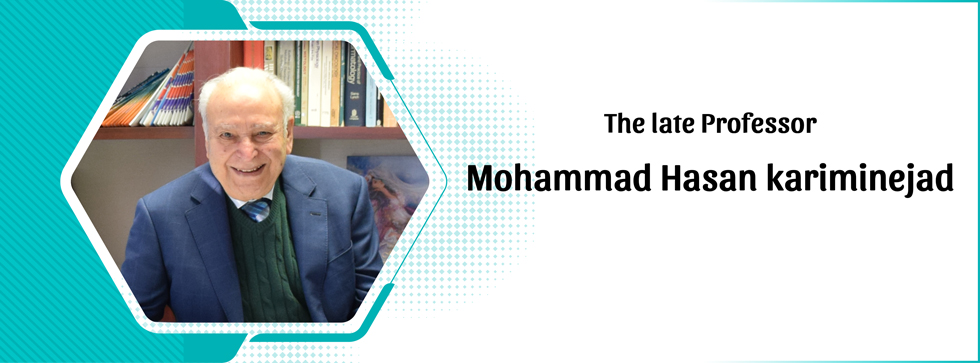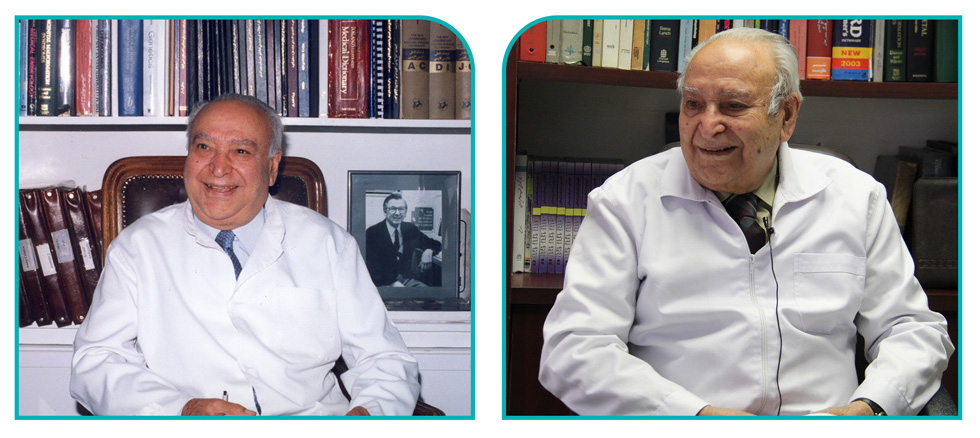Late Professor Mohammad Hassan Karimi Nejad

|| Professor Mohammad Hasan Kariminejad was born on November 13, 1928, in Sirjan, Kerman. He is the fourth child in the family and has three daughters. After completing his primary and secondary education in Sirjan and Isfahan, he entered the Tehran University of Medical Sciences and graduated with a medical degree in 1954. After six months of residency in the pediatric ward under Professor Dr. Mohammad Gharib, he fulfilled his military service as a pediatrician in Sirjan, serving his fellow townspeople for two years. He then pursued pathology specialization as an official resident at the Tehran University of Medical School and was promoted to professorship in 1961.
After obtaining his pathology specialization, due to his interest in pediatric diseases, Professor Kariminejad received a fellowship from the Swedish NIB Institute and earned a subspecialty in pediatric pathology at Karolinska Hospital in Stockholm. Upon returning to Iran, he completed further subspecialty training in cytopathology and human genetics under the supervision of the World Health Organization. In 1965, he was assigned to establish and manage the pathology department of the Women’s Hospital. This role allowed him to participate in the 4th training course in human genetics for medical faculty in 1968, and two refresher courses in 1970 and 1972. He established the genetics and cytogenetics lab at the Women’s Hospital (Jahanshah Saleh) in 1969, which became the most active medical genetics center at the time.
While managing the pathology and genetics lab, he spent two years at the pathology department of Massachusetts General Hospital, Harvard University, under the WHO fellowship. There, he trained under Professor Robert Scully in gynecologic pathology and received a subspecialty in that field. Upon his return, he was appointed head of the pathology department at Razi Medical School and a member of the academic promotion committee. His educational contributions also extended to medical universities in Iran, including Kerman, Yazd, Ahvaz, Zahedan, Qazvin, and others. When he noticed the young Kerman Medical School was facing closure due to a shortage of faculty, he and the late Dr. Abdollah Habibi moved to Kerman. He also brought back Dr. Hamid Tabrizchi, a pathology specialist, and helped teach parts of pathology and medical genetics, while encouraging other faculty to join. Dr. Kariminejad also taught at Chamran University in Ahvaz, Zahedan, paramedical schools, Iran University of Medical Sciences, Shahid Sadoughi University in Yazd, Qazvin, Islamic Azad University, and the University of Rehabilitation and Welfare Sciences, until the teaching needs were met.
In the spring of 1980, Professor Kariminejad requested retirement. Though this seemed like the end of his professional career, the following 37 years proved otherwise. He founded Kariminejad Pathology and Genetics Center in 1980 in the private sector, overcoming financial and bureaucratic obstacles. Believing that the greatest service is to teach and train others, he opened the center’s doors to all enthusiasts from the beginning. He implemented techniques such as banding methods in cytogenetics, tissue culture, analysis of aborted fetuses, amniotic fluid cells, chorionic villi sampling, and prenatal diagnosis. At that time, prenatal diagnosis required great courage due to legal and insurance issues. Another key service of the center was training interested individuals in cytogenetics. Initially, the goal was to assist human genetics students from Ahvaz University, who lacked mentors and practical training due to the war. A six-person training course was organized, where during a four-month internship, students practiced all steps of karyotyping, blood culture, harvesting, and analysis. Professor Kariminejad always followed his father’s advice that medical service is a divine gift and should not be tainted by material concerns, nor should those in need be deprived due to lack of financial means.

With the establishment of the Kariminejad-Najmabadi Pathology and Genetics Center (joined by Professor Hossein Najmabadi in 1996), Professor Kariminejad played a major role in expanding education and services in pathology and genetics. He is the founder of prenatal diagnosis in Iran since 1986. Throughout the years, with the support of his wife and children, Professor Najmabadi, and other colleagues, he has continuously strived to provide the best services and latest technologies at the center. Their close scientific relationships with international referral centers have helped bring the latest global advances to solve the problems of their valued clients. Dr. Kariminejad, in addition to serving as president and member of many scientific associations, has officially been a member of the Genetics Society of Iran since 1969.
